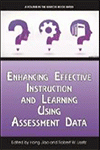
Enhancing Effective Instruction and Learning Using Assessment Data
Edited by:
Hong Jiao, University of Maryland
Robert W. Lissitz, University of Maryland
A volume in the series: The MARCES Book Series. Editor(s): Hong Jiao, University of Maryland. Robert W. Lissitz, University of Maryland.
Published 2022
This book introduces theories and practices for using assessment data to enhance learning and instruction. Topics include reshaping the homework review process, iterative learning engineering, learning progressions, learning maps, score report designing, the use of psychosocial data, and the combination of adaptive testing and adaptive learning. In addition, studies proposing new methods and strategies, technical details about the collection and maintenance of process data, and examples illustrating proposed methods and software are included.
Chapters 1, 4, 6, 8, and 9 discuss how to make valid interpretations of results and achieve more efficient instructions from various sources of data. Chapters 3 and 7 propose and evaluate new methods to promote students’ learning by using evidence-based iterative learning engineering and supporting the teachers’ use of assessment data, respectively. Chapter 2 provides technical details on the collection, storage, and security protection of process data. Chapter 5 introduces software for automating some aspects of developmental education and the use of predictive modeling. Chapter 10 describes the barriers to using psychosocial data for formative assessment purposes. Chapter 11 describes a conceptual framework for adaptive learning and testing and gives an example of a functional learning and assessment system.
In summary, the book includes comprehensive perspectives of the recent development and challenges of using test data for formative assessment purposes. The chapters provide innovative theoretical frameworks, new perspectives on the use of data with technology, and how to build new methods based on existing theories. This book is a useful resource to researchers who are interested in using data and technology to inform decision making, facilitate instructional utility, and achieve better learning outcomes.
CONTENTS
Technology Enhanced Formative Assessment Increases the Efficacy of the Homework Review Process, Kim Kelly and Neil Heffernan. Collection of Process Data in Web-Based Assessment Systems and Its Applications to Validating Noncognitive Constructs, Alex Brodersen, Matthew F. Carter, Cheng Liu, and Ying Cheng. Iterative Online Course Engineering Using Reinforcement Learning With Students’ Performance Profile, Machi Shimmei and Noboru Matsuda. The Promise of Learning Progressions-Based Classroom Assessments to Improve Instruction, Leanne R. Ketterlin-Geller and Robyn K. Pinilla. The Use of Predictive Modeling for Assessing College Readiness, Jason M. Bryer, Diana Akhmedjanova, Heidi L. Andrade, and Angela M. Lui. Designing Score Reports to Maximize Validity and Instructional Utility, Karen Barton and Audra Kosh. The Effects of a Formative Assessment Intervention on Teacher and Student Understanding of Basic Mathematical Principles, Julia Phelan, Kilchan Choi, Terry Vendlinski, Eva Baker, and Joan Herman. On Determining the Efficacy of Using Learning Maps as an Organizing Structure for Formative Assessment: Some Lessons Learned, Neal M. Kingston, Jessica Hess, Dale Cope, and Russell Swinburne Romine. A Balanced Approach to Using Assessment Information to Improve Teaching and Learning, Charles A. DePascale. Not All That Counts Is Safe for Counting: Barriers to Collecting Learning Data for Assessment Purposes, Jacqueline P. Leighton. Leveraging Ideas From Adaptive Testing to Adaptive Learning: The HERA Showcase, Meirav Arieli-Attali, Sue J. Ward, Vanessa Simmering, Yigal Rosen, and Alina A. von Davier. About the Contributors.
-
Paperback978-1-64802-626-3
Web price: $45.04 (Reg. 52.99)
-
Hardcover978-1-64802-627-0
Web price: $80.74 (Reg. 94.99)
- eBook978-1-64802-628-7

- EDU030000 - EDUCATION: Testing & Measurement
- COM021030 - COMPUTERS: Data Science: Data Analytics
- COM062000 - COMPUTERS: Data Science: Data Modeling & Design
-
 Application of Artificial Intelligence to Assessment
Application of Artificial Intelligence to Assessment
-
 Data Analytics and Psychometrics
Informing Assessment Practices
Data Analytics and Psychometrics
Informing Assessment Practices
-
 Innovative Psychometric Modeling and Methods
Innovative Psychometric Modeling and Methods
-
 Machine Learning, Natural Language Processing, and Psychometrics
Machine Learning, Natural Language Processing, and Psychometrics
-
 Technology Enhanced Innovative Assessment
Development, Modeling, and Scoring From an Interdisciplinary Perspective
Technology Enhanced Innovative Assessment
Development, Modeling, and Scoring From an Interdisciplinary Perspective
-
 Test Fairness in the New Generation of Large‐Scale Assessment
Test Fairness in the New Generation of Large‐Scale Assessment
-
 The Next Generation of Testing
Common Core Standards, Smarter‐Balanced, PARCC, and the Nationwide Testing Movement
The Next Generation of Testing
Common Core Standards, Smarter‐Balanced, PARCC, and the Nationwide Testing Movement

